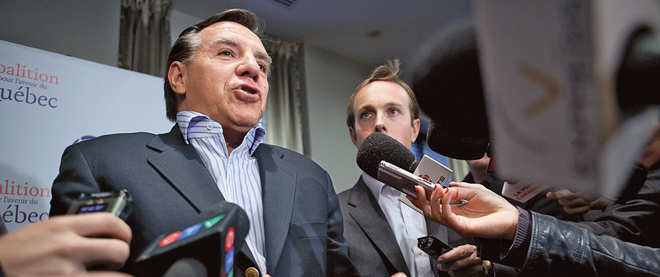François Legault to the rescue
In the former airline exec, Quebecers are once again looking for a political saviour
Tim Snow/The Gazette
Share

Long before he became Quebec’s would-be saviour, François Legault was a businessman who, in 1986, co-founded a popular Quebec-based charter airline. Having been obsessed with efficiency in the private sector, Legault was reportedly put off by the cumbersome process by which new political entities are registered in the province. So when it came time for him to turn his Coalition pour l’avenir du Québec, Legault’s right-leaning pseudo think tank, into a full-blown political party, he chose a novel way to make it legit.
Rather than having 100 candidates mail in their support of the party and wait for the province’s director-general of elections to authenticate everyone—a part of the law that can take upward of two months—Legault and 100 of his supporters marched into the election authority’s Quebec City offices themselves. It was an irresistible bit of political theatre, a jaunty example of participatory democracy you rarely see from the right flank of Canada’s political spectrum: Legault the Pied Piper, literally leading his supporters toward the supposed reinvention of Quebec’s political scene.
Yet if Legault’s approach was novel, the popularity of this formerly retired politician is anything but. Legault, who has ridden high in the polls for nearly a year, is the latest in a long line of federal and provincial leaders from Quebec who find themselves suddenly, and almost absurdly, popular. The next provincial election is as many as two years away; still, given his sustained perch at the top of the polls, it is safe to say that Legault has benefited from the politician-as-saviour phenomenon, one seemingly as Québécois as Bixi bikes, depanneurs and the adding of curd cheese to gravy and french fries.
Ever since Jean Lesage wrested power from Maurice Duplessis, delivering Quebec from its parochial, Church-obsessed reality, many of the province’s leaders have swung into power (or close to it) by harnessing the population’s malaise with the status quo. Consider René Lévesque, who captured imaginations and votes with his fight for Quebec sovereignty. A decade after Lévesque retired, Quebec’s heartstrings were pulled once again by Lucien Bouchard, who left Brian Mulroney’s cabinet in a huff to lead the Bloc Québécois and eventually come within a hair’s breadth of Lévesque’s own dream.
There’s Mario Dumont, the young idealist who flirted with the sovereignty movement before becoming the province’s doyen of right-wing populist politics. And, though it’s hard to imagine today, Jean Charest himself was wooed to the Liberal Party of Quebec’s bosom from his post as leader of the Progressive Conservative party after flirting with Quebec’s electorate for nearly a year. At the federal level, meanwhile, Pierre Trudeau, Brian Mulroney, Gilles Duceppe and Jack Layton were all initially hugely popular, and all rode to power on a wave of collective good- will. The question is: why is Quebec so easily enthralled with saviour politicians?
Part of it may be the leaders’ own narratives, regardless of their political allegiances. Both the left-leaning Lévesque and right-leaning Bouchard were hugely popular for having taken on Ottawa’s powers that be—and both became more popular still, once Quebecers felt they’d been slighted by the rest of the country. To French Quebecers, Jean Charest was a young, socially liberal conservative who could put Quebec’s books in order; to the English in and outside Quebec, he was a confirmed federalist—known as Captain Canada during the referendum of 1995—who could “fix the separatist problem” once and for all. Quebecers decided that Gilles Duceppe, the staunchly sovereignist leader of the Bloc Québécois, could best defend their interests in Ottawa—until they decided Jack Layton, the staunch, Toronto-bred federalist, was better suited, and Duceppe was all but kicked to the curb.
“There’s no other place in Canada where everybody switches left or everybody switches right like in Quebec,” says history professor and bon vivant Neil Cameron, who served as an MNA in the Anglo-rights Equality Party from 1989 to 1994. “It’s turned all sorts of unlikely people into saviours, and you don’t know how much has to do with the guy, or with who happens to be there when they decide to switch.” (The exception is Lévesque, Cameron says. “The charisma was real with him.”)
It’s too early to see how François Legault will fare as Quebec’s newest political saviour. It’s clear, however, that he’s not entirely comfortable with the role. “It worries me, because I don’t want there to be change for the sake of change,” Legault told Maclean’s earlier this year.
Perhaps he’s worrying about the flip side of the equation: without exception, all of Quebec’s would-be saviours have inevitably and ignobly fallen from grace.